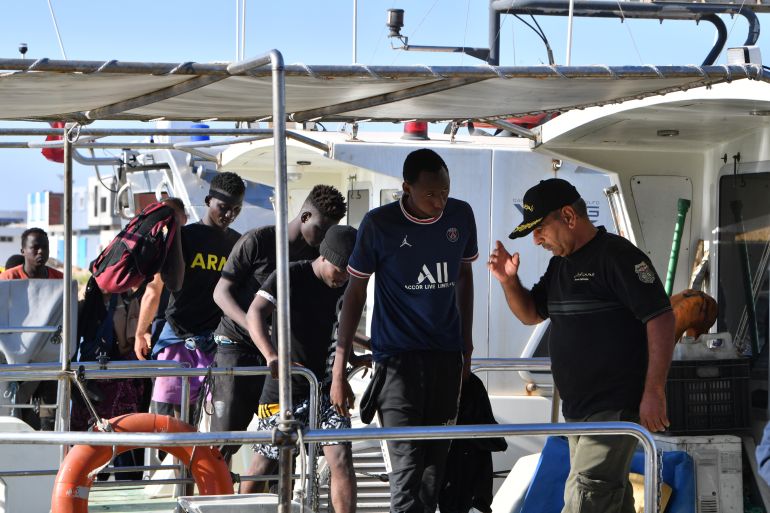Five dead as boat carrying refugees sinks off Tunisia
The deaths include at least one child and two women, according to a judicial source in the port city of Sfax.

At least five people have died and seven others are missing after their Europe-bound boat sank off Tunisia’s coast, according to state news agency (TAP).
“Coastguard units in Sfax recovered the bodies of five migrants and rescued 23 people, while seven others are missing, after boat carrying mostly Tunisians but also sub-Saharan Africans sank off Sfax’s Sidi Mansour,” it added.
Keep reading
list of 4 itemsPhotos: Panama’s Darien Gap good for tourists, hell for migrants
Tunisia recovers bodies of 13 migrants after boat sinks off coast
Death toll in Greece refugee boat tragedy soars to 78
The deaths include at least one child and two women, court spokesman Faouzi Masmoudi said. The boat sank “less than an hour after departure”, according to the spokesman.
Tunisia lies on a major route for refugees and migrants travelling to Europe. The number of people departing from Tunisia and trying to reach Europe has significantly increased in recent months.
Last week a boat carrying 20 Tunisians sank just 120 metres (394 feet) from the coast in Gabes, with at least two reported dead, including an infant.
The court has launched an investigation into the latest shipwreck, Masmoudi said, as search operations were under way.
According to the International Organization for Migration, more than 1,800 people have died this year, double last year’s total, on the central Mediterranean route – the world’s deadliest.
Increasing numbers
The Tunisian coastguard says it intercepted 34,290 people attempting to cross to Europe in the six months leading up to June 20, most from sub-Saharan African countries, compared with 9,217 over the same period in 2022.
The number of people from sub-Saharan African countries trying to make the crossing has spiked since Tunisian President Kais Saied claimed in a February speech that “hordes” of irregular migrants were causing crime and posing a demographic threat to the mainly Arab country.
Hundreds of Black sub-Saharan Africans were also arrested or chased into the desert after the deadly stabbing of a Tunisian man in a brawl with refugees and migrants in Sfax on July 3.
Tunisians have also opted for the sea journeys in growing numbers as the country faces a grinding economic crisis and severe shortages of basic staples.
European Union leaders and the Tunisian government in July signed what they call a “strategic partnership” deal, allocating 100 million euros ($109m) to Tunisia to help it combat undocumented immigration.
However, the EU has been criticised for its cooperation with Saied, who has become increasingly authoritarian at home, both to refugees and migrants, as well as to domestic opponents.